
We recently reported that Emma Twyford had become the first British woman to climb 9a with a redpoint of The Big Bang (9a) at Lower Pen Trwyn, North Wales. Emma's ascent is only the third of this route, first climbed in 1996 by Neil Carson.
The line was a two-year project for Emma, who adds 9a to an already impressive résumé of three E9 headpoints (Rare Lichen, Once Upon a Time in the South West and The Big Issue) and multiple E7 flashes. The Big Bang is notoriously sharp with a particularly severe finish around V9, which was a heartbreaking highpoint on many attempts made by Emma. Due to the coastal ad tidal nature of Lower Pen Trwyn, the route is frequently inaccessible or out of condition for climbing. James McHaffie made the second ascent in 2011 (UKC News).
'Did that just happen?' a bemused Emma asked belayer Angus Kille after clipping the chains and descending. As is often the case, the successful attempt went down without much struggle, and Emma felt 'in the zone' despite less-than-perfect conditions at the crag. An all-too-brief celebration with prosecco followed, before she had to get to work route setting for the BLCCs. We sent Emma some questions to find out more about her landmark ascent.
I think if you want something enough all you can do is try to get there at your own pace - you may fail but the bigger failure would be to not try at all if that is your dream.
In what ways do you think your climbing has changed in the last few years? It must be a combination of both mental and physical factors?
I think physically I have learnt to train a little smarter between all the route setting! Mentally I have stopped letting a car crash I was involved in in the past hold me back. I'm older and wiser; everything I have learnt in climbing has come together. I'm a more confident climber in my 30s than I was in my 20s.
You chose not to diet in order to climb the route. Can you explain why this was important to you? What do you think of the culture surrounding weight loss and ticking hard routes?
I think one of the big things in climbing is that power to weight ratio plays a big part in high level climbing performance so it is easy to get sucked into all sorts of diets. Because of eczema I have very little dairy and I'm mostly gluten free as I find I'm less tired if I don't have it. I don't fluctuate much in weight but I'm setting a lot of the time so I tend to just listen to my body and if I'm hungry I'll demolish a load of food! The temptation to diet for the route to get it done was appealing occasionally, but I wanted to be healthy about doing the route. Dieting can lead to a higher risk of injury, but I also wanted to give a good message to up and coming female climbers that if you eat sensibly and are healthy then you don't need to cut out food groups or treats to climb well. It is hard when you see so many light and strong female climbers not to wish you were the same build and weight as them, but we each have unique bodies and I think it is important to be happy with what you've got and to make the most of what works for you.
How much would you say that shifting between trad and sport has helped you improve in each discipline?
I love both disciplines in different ways. Sport keeps me strong, it pushes me physically and challenges my mental discipline. Because I can push my physical limits in sport climbing it can challenge my confidence and self belief but in a good way. As a bonus it keeps me strong for any of my trad projects, especially if I am trying sport routes at my limit. Trad pushes me in a very different way but if I am on-sighting a route it means I have to hang on for a long time which almost keeps me fitter for sport climbing. It pushes me to get in the zone; I know that most of the time I am comfortable with the physical difficulty of the route but I have to keep it together mentally and stay calm because sometimes the consequences wouldn't be great. I think going between the two keeps me psyched and to a certain extent they have both helped compliment each other, though I think the sport helps my trad more.
British women have been more or less at the forefront of hard trad globally, but we've lagged behind a fair bit in terms of sport (a consequence of UK trad culture/ease of access to sport most likely). What do you think about the future of hard sport climbing by British women - will it continue to improve or will competition climbing take priority for the next generation?
I think there are many strong women in the UK who have the potential to push hard sport climbing forward, some who climb outside and some who compete. I think with the Olympics coming up it may take priority but I'm hoping as the field gets broader that there will be some who get inspired and psyched to climb outside and push things forward.
In the past you have focused more on onsighting, flashing and quick redpoints/headpoints. Was this in part because of the British climbing scene's 'glorification' of 'good style', as well as enjoying it yourself? What have you learned from the long-term projecting process, which is typically more common on the continent?
I think they were all personal choices, I always thought if something was safe (especially with sport) then it was good to try and onsight or flash it to give something my best go even if I failed. It's nice though sometimes to get a quick, feel-good success when I'm busy with work and it sets you up well psychologically! As my housemates would say I've only climbed a handful of routes this year with having a big project. I've learnt that I'm really stubborn. I enjoyed the process more than I thought I would but I didn't quite appreciate how much of a head game it would become. I'm glad I had something to try close to home but the tides and fickle conditions on such a hard route definitely tested my patience. I think next time I would have my projecting eggs in more than one basket.
You don't train specifically or follow a programme. Do you think you would ever consider training differently, or does it work better for you not to be so structured?
Unless my work changes or I have more free time then the training won't change. I prefer to be able to just listen to my body and train efficiently if I'm not too knackered after setting but if I feel like I need to rest then I do. It really helps me to not have a structure because I would end up injured if I trained properly and route set, but I have an idea of what I need to train and focus on that when I feel good. This means I don't get stressed if I don't have a plan!
You documented parts of your journey to climbing 9a on social media, with video clips of your highpoints etc. Did it help to share frustrations and garner support from friends?
I was quite reserved about posting it up too much because I wanted the journey to be personal, but occasionally I would post something up. To be honest I much preferred everyone taking the piss out of me at home because it didn't feel like there was any pressure then.
How much do you think women in particular are limited by their own expectations, which are greatly shaped by society's expectations? I spoke to Linda Sjödin last week about ticking New Base Line and it was interesting to hear about her initial fears that she wasn't good enough to even touch it, purely based on looking at the women who'd done it before like Shauna Coxsey, Alex Puccio and Anna Stöhr. Because of the achievements and profile of these climbers, she instantly compared herself to them and deemed herself unworthy. She needed encouragement from others to simply give it a go. You are a role model for female climbers, but do you worry about being put on a pedestal?
It's not really something I try to think about too much because I'm just a normal person who goes climbing to enjoy it like anyone else and I hope this encourages anyone to push their limits, whatever that happens to be and not to be held back by a number etc. I think it is perhaps easier to look at a grade and write it off but as with anything you can get shut down on something easy that isn't in your style and then easily climb something harder that is in your style. It's such a big can of worms, but the only advice I can give is for women to have the confidence to challenge themselves and push outside comfort zones. Don't be afraid to go against society's expectations, be curious and be kind to yourself. In an age of celebrity, especially with social media, it is easy to put someone you idolise up high but that doesn't mean much. They have worked hard to get there, and yes sometimes their achievement may seem like an impossible goal but you also never know. I think if you want something enough all you can do is try to get there at your own pace - you may fail but the bigger failure would be to not try at all if that is your dream.
Which means more to you: claiming the first British female 9a, or claiming only the third ascent of The Big Bang overall?
I think both mean something in different ways but I have to say the 3rd ascent of this route means more to me because it shows how hard this route really is, especially when you throw in all the other factors. It was first climbed in 1996 and it really was an amazing achievement from Neil Carson.
You've climbed a lot with James McHaffie and shared projects over the years and he made the second ascent of The Big Bang. How important is it to you to have climbing partners/friends of a similar ability whom you can work with? What have you learned from Caff, and what's he learned from you?
I think for trad projects or alpine projects it can be pretty important to have partners or friends of a similar ability, but for sport climbing it doesn't matter so much as long as you trust that person and they have good psyche. I think I've learned a lot of my climbing style from Caff by watching him over the years and he also taught me how to push it safely on trad. He really has been a great mentor for me and a good friend. I'm not sure if he has learned much from me to be honest, maybe that motivation and stubbornness pays off eventually! ;)
What's next?
Well I think I need to let this sink in first and then I'll figure out some new goals, but I really want to enjoy the moment.



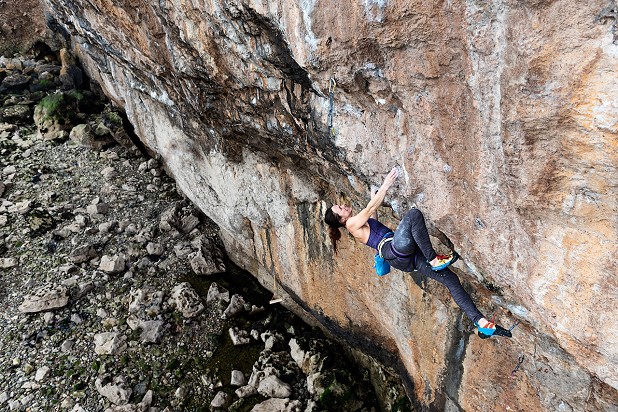
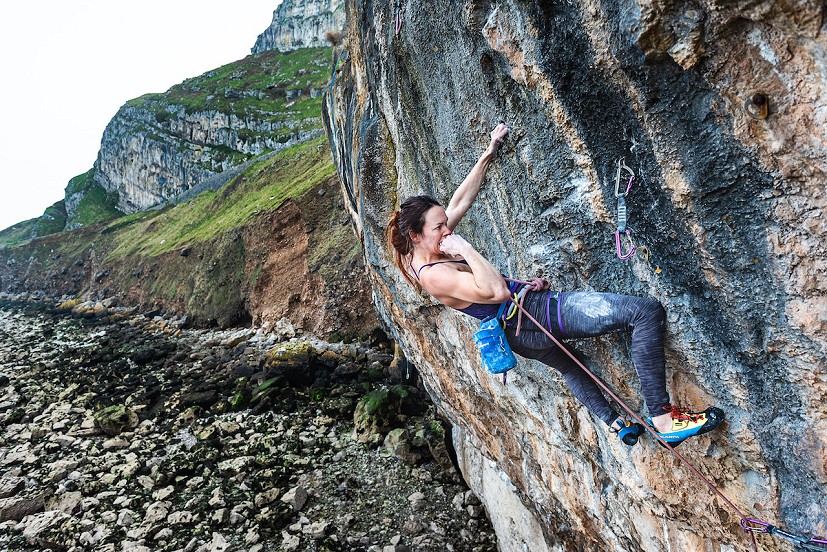
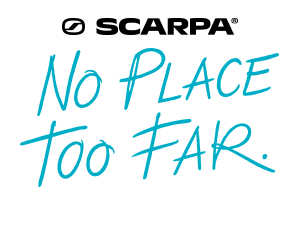

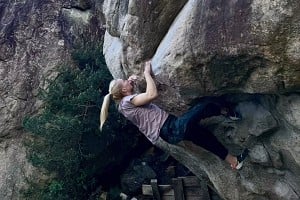
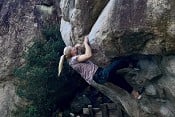




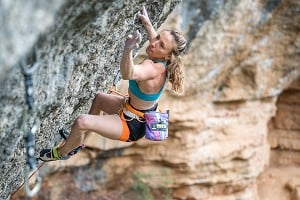
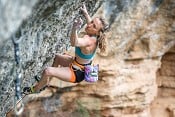
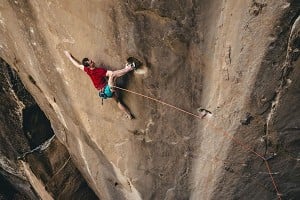
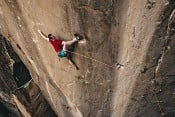

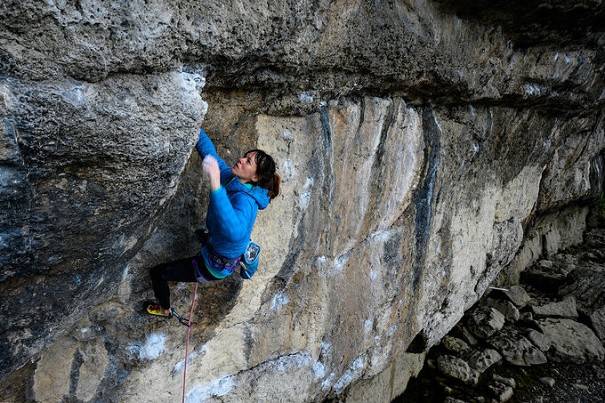
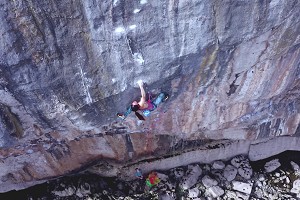
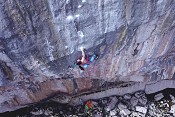
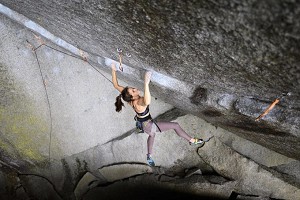
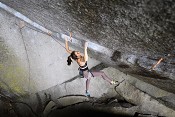
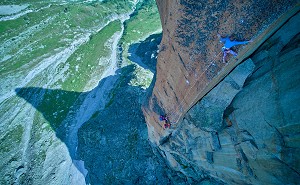
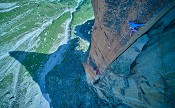
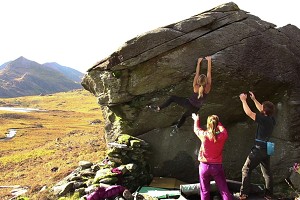
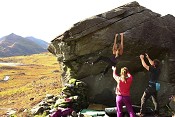
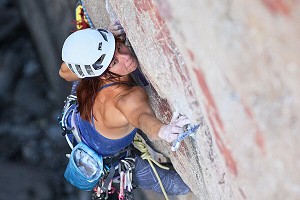
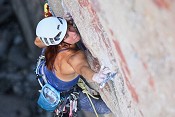
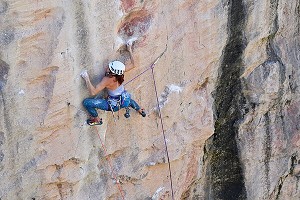
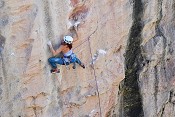
Comments